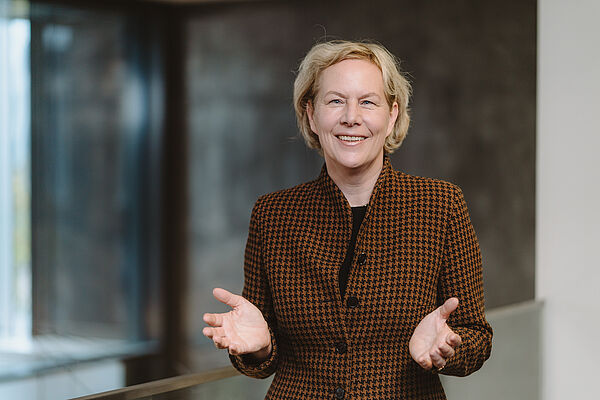Here you can find out more about the latest news from Partners in Transformation, which we have already briefly presented to you in our newsletter.
You want to subscribe to the newsletter? Please register here.
News from the Partners in Transformation (4-2025)
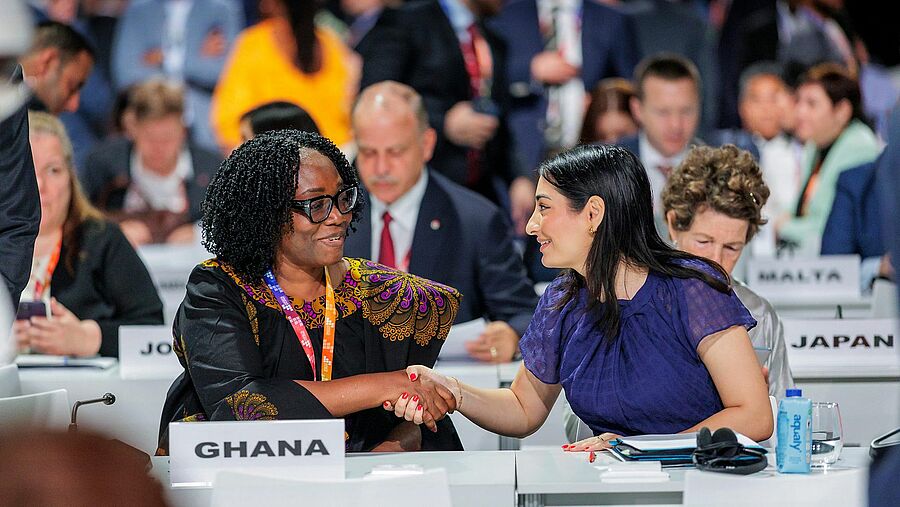
sequa: Organic wine from Georgia – how a partnership is transforming the agricultural sector
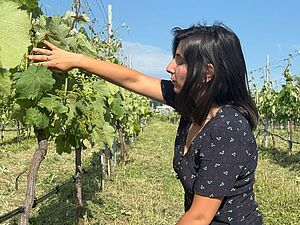
A chamber and association partnership between Naturland and Georgian agricultural associations shows how practical training and advisory services are promoting sustainable organic agriculture and creating fresh prospects for organic wine in Georgia and Germany.
Georgia – the homeland of wine with a future
Georgia is considered the birthplace of wine. The country’s winemaking tradition goes back over 8,000 years and carries as much agricultural as cultural significance. Georgia boasts an impressive array of indigenous grape varieties, which are becoming all the more valuable with the advance of climate change. However, if the country is to leverage this advantage in the long term, then it requires expertise, modern standards and access to global markets.
Organic agriculture associations disseminate knowledge
This is where the chamber and association partnership between Germany’s Naturland-Verband e.V. and Georgian agricultural associations comes in. The project seeks to promote sustainable growth and employment in Georgia’s organic agriculture sector and assist associations within the sector to develop innovative, market-oriented offerings for the organic farmers they represent. In addition to viticulture, the partnership also covers sustainable aquaculture, organic wild harvesting and organic hazelnut production.
Practical guide for start-up phase
One of the partnership’s main outputs is a practical guide to organic viticulture, developed jointly by experts from Georgia and Germany. Containing a detailed costing model for organic and conventional winegrowing, the guide will prove especially helpful as a start-up aid for winemakers looking to switch to organic cultivation.
Peer-to-peer dialogue
‘Engaging in dialogue with our German counterparts was highly rewarding for us as experts and for winemaking businesses in Georgia too,’ says Tekle Zakalashvili, a viticulture expert with the Sustain Caucasus International Alliance and the Georgian Farmers’ Association (GFA). As well as facilitating knowledge transfer, these networking opportunities foster mutual trust, boost motivation and encourage innovation in agricultural techniques.
Mutual benefits
The partnership is bearing fruit in both countries. In Georgia, it is creating opportunities for young farmers, promoting entrepreneurship and supporting entire regions as they transition to organic agricultural practices. In Germany, organic farmers are benefiting from new approaches, while importers and consumers now have greater access to high-quality organic produce from Georgia. To learn more about the project, click here.
Learn more about the partners
Naturland e.V.
Sustain Caucasus
DSIK: Access to finance changes lives – the savings bank concept and its impact in East Africa
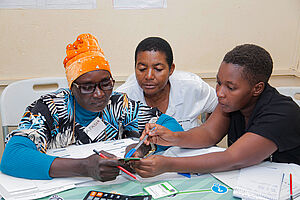
What happens when people are suddenly given access to a bank account? When they learn how to save money, use loans and make cost-efficient plans? As seen in the case of East Africa, it changes everything. After all, a bank account is more than a mere piece of technology; it is the first step to financial independence. This is where DSIK, Germany’s non-profit savings bank foundation for international cooperation, comes in with its work in countries such as Tanzania, Ethiopia and Rwanda. DSIK teams up with local partners to help modernise microfinance institutions and gear their products and services to the needs of the general public.
Professionalisation for lasting impact
1,303 economic actors and educational institutions, including 1,282 financial institutes, were supported through targeted organisational development measures in 2024, receiving assistance with digitalisation processes, product development, regulatory matters and training. A tool was developed in Tanzania in cooperation with local partners to digitalise banking operations. This represents a milestone for rural microfinance institutions, enabling them to operate more efficiently and systematically.
Financial products create new opportunities
Providing access to suitable financial products is a particular priority. For this reason, the partner institutions worked with DSIK to bring 84 new financial products to the market in 2024, from a basic bank account for disadvantaged groups to loans provided under fair terms. These products are now used by over 923,000 people in the region, over one third of them women. Behind these statistics are real people who have now been empowered to start a small business, sell their harvests more effectively or invest in their children’s education and training. With access to suitable financial services, these individuals can now build a new future.
Education effects long-term change
If the project is to make a sustainable, long-term difference, then facilitators must also be brought on board. A total of 25 vocational college curricula were revised and adapted in 2024. At the same time, 295 vocational instructors, including 151 women, underwent further training These measures ensure that knowledge is passed on to the next generation of entrepreneurs and professionals.
Helpdesk on Business and Human Rights: Joint supplier training with the BGA
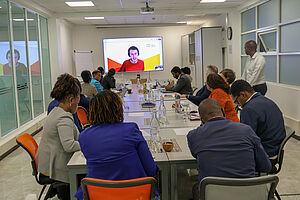
In order to prepare suppliers from production countries for supply chain laws, the Agency for Business and Economic Development (AWE), the Helpdesk on Business and Human Rights and the Import Promotion Desk (IPD) have pooled their resources and developed a modular, practice-oriented training programme with the German Wholesale, Foreign Trade and Services Association (BGA). The pilot project strengthens the diversification of German procurement channels in important import markets such as Serbia, Indonesia and Peru.
As a free support service of the Federal Government, the Helpdesk advises companies of all sizes on the implementation of human rights due diligence processes. The Helpdesk e.g. offers companies a free and personalised training programme and an online course to help them actively establish human rights due diligence processes in their core business. You can find out more about the Helpdesk's entire offer for companies on the website here.
AWE: Training and recruiting tourism professionals - eAcademy Tourism & Hospitality
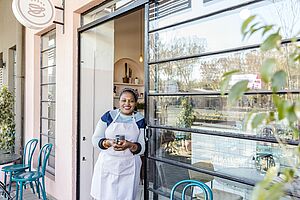
Around one in ten jobs worldwide depends on tourism, an estimated 340 million jobs. This makes tourism an important economic factor, not least for many countries in the Global South. However, there is often a lack of qualified employees, especially as the global travel and tourism market is currently experiencing a trend towards sustainable travel options that prioritise the protection of the environment and culture.
With the eAcademy Tourism & Hospitality, the Agency for Business and Economic Development (AWE) offers a customised and free of cost online learning programme. It enables companies to equip employees with the necessary knowledge in a broad and practical manner. It is also available to all interested parties who wish to qualify as tourism experts or undergo specific further training. Three of the ten modules are specifically dedicated to the sustainable tourism. Companies also have the option of customising the offer to suit their specific needs.
The eAcademy's self-study courses are thematically bundled and can be used flexibly. Varied and entertaining learning content are motivating and catchy. Users can have their learning success certified. The online courses are available in three languages (EN, ES, FR), they are hosted on the learning platform atingi.org of the Deutsche Gesellschaft für Internationale Zusammenarbeit (GIZ). With 1.3 million courses already completed, they are the most successful learning programme there.
To learn more about the eAcademy Tourism & Hospitality and all courses click here.
Watch the YouTube video for a quick overview what to expect.
AWE: Partnership with DGB and ILO in the Balkans
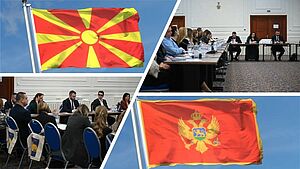
Together with the German Trade Union Confederation (DGB), the Agency for Business and Economic Development (AWE) is supporting the International Labour Organization (ILO) in transforming the economy in selected Eastern European countries in a socially just way. The objective is to strengthen employee participation through social dialogue - both in labour law issues such as the right to freedom of association and collective bargaining and with regard to an environmentally and climate-friendly economy. Special attention is paid to the protection of vulnerable sections and the empowerment of young people and women.
Greater social justice and more active climate action through social dialogue
The central objective of the participants is to reform and systematically develop labour law in the selected partner countries, North Macedonia and Montenegro. The focus here is on strategy and measures that serve to improve policy development, for example to include effective climate action on national agendas and to improve and strengthen the argumentation and negotiation skills of the parties involved in the social dialogues.
How do companies and development cooperation benefit?
The companies active in these partner countries benefit from establishing sustainable production processes and being able to distinguish themselves in international competition. The measures also aim to safeguard industrial peace. For development cooperation, the focus is on socially fair working conditions and the social participation of employees through co-determination, as well as the targeted promotion of ecological precautions and climate resilience - and this has an impact beyond national borders.
The background
The project to strengthen social dialogues in North Macedonia and Montenegro began in December 2024 and is a concrete implementation of the international call for more co-determination in the context of socially just economic change formulated at the Hamburg Sustainability Conference (HSC) 2024.
The HSC 2025 in June reiterated the importance of scalable employment promotion, social protection and inclusive social dialogue when it comes to a Just Transition to a climate-resilient, low-carbon economy. The project follows this international agenda.
Hamburg Sustainability Conference: global alliances for a sustainable future
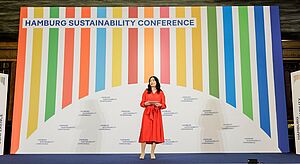
The Hamburg Sustainability Conference (HSC) brought together 1,600 decision-makers from more than 110 countries in unsettled times at the start of June. Interest from the private sector was especially high: A third of the participants came from enterprises and business associations. ‘Now more than ever!’ really summed up the mood of the conference.
The theme ‘New alliances start here’ set the tone for the event: international collaboration is needed despite – or especially because of – cuts in development cooperation by some provider countries at this time. Stakeholders from politics, business, academia, civil society and international organisations took the opportunity to forge new alliances and launch initiatives. German Federal Minister Reem Alabali Radovan emphasised the value of alliances and synergies. Her message: ‘We all do better when we work together – not against each other.’
One example is the Hamburg Sustainability Platform (HSP), an initiative of public and private institutions that is laying the foundation for truly scaling private investment for sustainable development in emerging economies and developing countries. Now operating under the new name SCALED – Scaling Capital for Sustainable Development – the initiative includes Germany, Canada, Denmark, France, the UK, South Africa, KfW Development Bank and the private institutional investors Allianz, AXA SA, La Caisse (CDPQ) and Zurich Insurance Group.
You can read more about HSC 2025 and the new initiatives and alliances here.
Find here the keynote speech by the Federal Minister Reem Alabali Radovan and the joint press release on SCALED.
Published on
